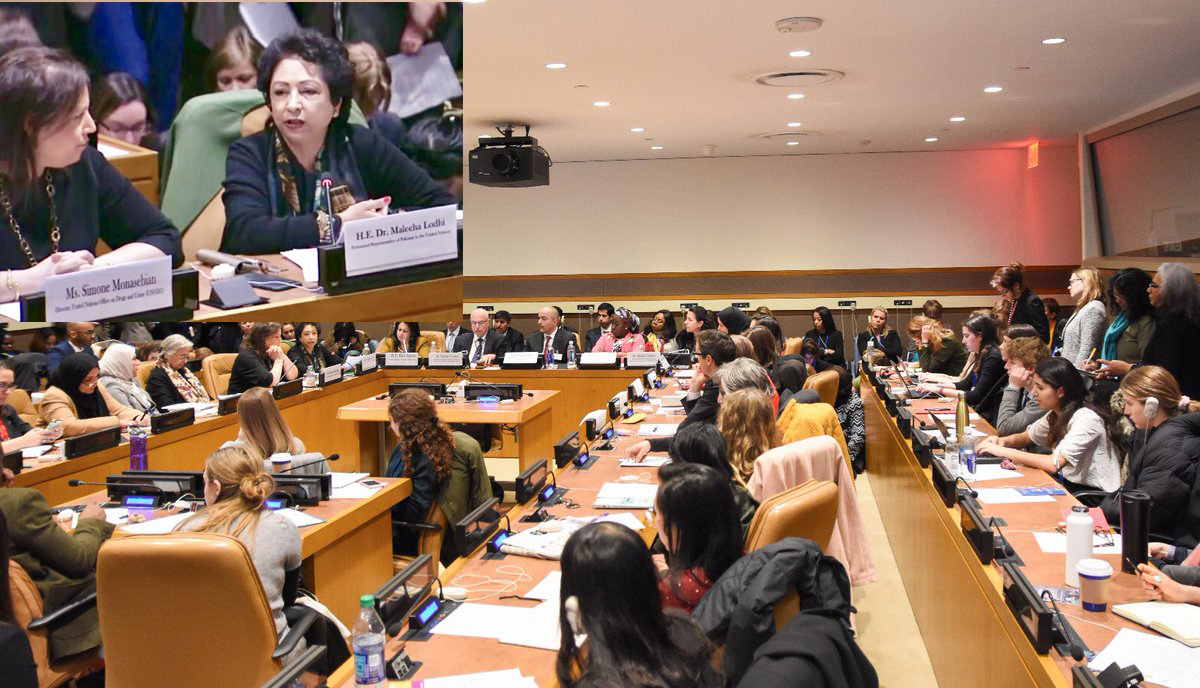Pakistan security forces, people braved terrorism with courage: Maleeha Lodhi

NEW YORK (APP) – Pakistan’s Permanent Representative Dr Maleeha Lodhi to the UN Dr Maleeha Lodhi has said the Pakistani people and their security forces have braved the challenge of terrorism with ‘exemplary courage’ to turn back the terrorist tide.
She was speaking at a high-level side-event hosted by Pakistan with Turkey, Qatar, Iran, Indonesia, Canada and Gambia on Monday.
“Over the past several decades, Pakistan has seen the spread of terrorism in our region as a consequence of endless conflicts and turmoil, driven primarily by foreign interventions and the existence of unresolved disputes in our neighborhood,” she said.
The annual meeting of the Commission, which dates back to 1947, brings more than 9,000 representatives from civil society organizations to the UN over the course of the next two weeks.
This year’s theme is social protection systems, access to public services and sustainable infrastructure for gender equality and the empowerment of all women and girls.”
Many of the marathon-discussions are expected to also focus on gender equality and the 2030 Agenda for Sustainable Development.
Noting that women and girls, whether as victims or perpetrators, were disproportionately affected by responses that failed to incorporate a strong gender perspective, Ambassador Lodhi said Pakistan’s rehabilitation approaches focus on training programmes for women to create economic opportunities in the post-incarceration phase in partnership with civil society.
“We view credible community actors, including media and religious leaders, as vital partners,” she said. Religious leaders, mobilized by the government, had been encouraged to issue ‘Fatwas’ which unequivocally condemn terrorism and promote the concept of a plural society with equal rights for women and girls.
Pakistani police women were being encouraged to assume leadership roles in an effort to promote trust and engagement between female affectees or victims and local law enforcement personnel, Ambassador Lodhi said. At a broader level, efforts were underway to create conditions that support greater female participation in the country’s security forces.
Turning to the broader goal of empowering women, the Pakistani envoy said her government had set up with support from NGOs de-radicalization and rehabilitation centers which employ various tools to reintegrate young boys and girls back into societies as well as support the families of former militants . One such center, she said, was Sabaoon, a female-led organization, which could serve as a useful model for others.
Technical and vocational training centers, being managed with support from NGOs, were taking steps to strengthen the resilience of communities and create an environment that discouraged any resurgence of violent extremism.
In addition, the Pakistani envoy said, the Benazir Income Support Programme was working on poverty-exit strategies for women and promoting financial independence. “This has also contributed to creating viable alternatives and opportunities for women.”
A comprehensive ‘Youth Programme’, she said, provide young and under privileged girls and boys with skills training, access to higher education, employment and micro-credit.
Other speakers also underscored the need for including a strong gender perspective in evolving effective criminal justice responses to terrorism and to adopt an approach based on gender mainstreaming and human rights.
The panelists emphasized that strong approaches to tackle terrorism must take into account the multifaceted and distinct ways in which women, men and children are involved in, and impacted by terrorist violence.
Among those who spoke were Qatar’s Minister of Administrative Development, Labour and Social Affairs, Yousuf Mohamed Al Othman Fakhroo; Nigeria’s Minister of Women Affairs and Social Development of Nigeria, Ms. Aisha Abubakar; Iraq’s Deputy Minister of Foreign Affairs, Ms. Hala Shakir Mustafa Saleem; as well as the UN Under-Secretary-General for Counterterrorism, Vladimir Voronkov; the Assistant-Secretary-General, UN Counterterrorism Directorate, Michelle Coninsx, and the Director of UN Office on Drugs and Crime, Simone Monasebian.
The event, which was attended by a large number of delegates, UN officials as well as members of civil society, helped in generating greater awareness about the challenge associated with rehabilitating and reintegrating former terrorists.







